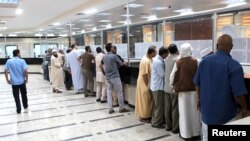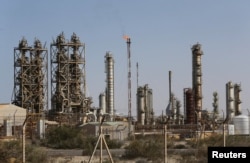After a month strolling the gold market in Libya's capital, retired public servant Milud Farhat was unable to find any jewelry he could afford for his daughter's wedding.
The 60-year-old is typical of Libya's once well-to-do middle class, impoverished by high inflation and devaluation during years of conflict in what used to be one of the Arab world's wealthiest countries.
In contrast, armed groups whose commanders cruise Tripoli's potholed streets in luxury cars have become rich by forcing authorities to hire them and grant them cheap dollars they can change on the black market for a premium.
To tackle this "war economy," Tripoli's internationally recognized government in September effectively devalued the exchange rate to 3.9 dinars per dollar from 1.3.
That cut the black market rate from 6 to 5.2, which shoppers and traders said had slightly eased prices for food and other goods, many of which are imported.
'Just suffering'
But for Farhat, who lives on a pension of 400 dinars per month, it made little difference. The wedding of his youngest daughter, his seventh child, is coming up, and jewelry for the bride is a must in Libya.
"I have been coming every day for a month hoping that [gold] prices go down," he said. "Normal people are just suffering."
Gold prices have dipped a little to around 180 dinars ($46) an ounce since the devaluation but are still triple their level in 2014, when the dinar started diving because of volatile oil revenues, Libya's lifeline.
"The gold market is still very, very weak. Seventy-five percent of people coming are just asking," said gold trader Abdelhamid al-Zawi, standing in front of his empty shop.
Wheelbarrows
Economic policies are distorted by rivalry between the Tripoli government and a parallel administration in the east that set up its own central bank in the aftermath of the NATO-backed uprising that toppled Moammar Gadhafi in 2011.
Overall oil revenue is up: The Tripoli-based National Oil Corp. expects income from crude and oil product sales to hit $23.7 billion in 2018, a 73 percent jump from last year.
But money in the banks can be scarce. Many keep cash at home because they do not trust banks or play the black market.
To undermine street dealers based just behind the Tripoli central bank headquarters and gold merchants doubling as currency traders, authorities slapped a 183 percent fee on commercial hard currency deals in September, moving the rate to 3.9.
They also stopped restricting credit letters for imports, which Deputy Prime Minister Ahmed Maiteeg said would help end the liquidity crisis by early 2019.
For a small and well-connected elite, money is still flowing as they keep a grip on business and oil revenues. In Tripoli's upmarket neighborhoods, sleek stores sell international fashion brands, and new restaurants and cafes are opening.
But elsewhere in the capital, building projects halted during the 2011 uprising litter the skyline and rubbish lies uncollected. Many are still queuing at banks, hoping to access their salaries, but they are unable to withdraw significant amounts.
"Sometimes you get 150 dinars. What can you do with that?" said Mahdi Ali Makhfuth, another pensioner shopping for food with two sons.
Authorities have also allowed citizens to bring up to $10,000 from abroad with credit cards, which Maiteeg said was bringing down the black market rate.
Help for upper class
But Makhfuth dismissed the measure as benefiting the rich.
"Do normal citizens have 40,000 dinars in their accounts? No," he said, referring to the amount needed to access that maximum dollar allowance.
Since a series of raids on the black market that began in September, dealers who use black plastic bags to carry dollars and wheelbarrows for devalued dinars have simply shifted into the labyrinth of the old city.
And despite new central bank measures to prevent currency scams, Alaeldin Elmasallati, commissioner at Libya's audit bureau, said they would still be possible because of a lack of enforcement capacity.









